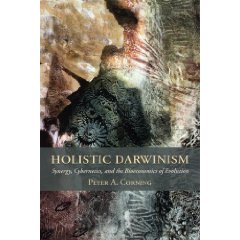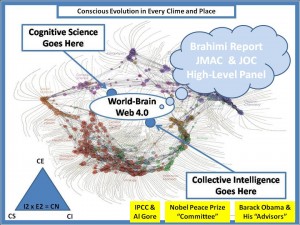
![]() Beyond 6 Stars–And a Seventh for Accessible Pricing
Beyond 6 Stars–And a Seventh for Accessible Pricing
Consilience: The Unity of Knowledge
Nonzero: The Logic of Human Destiny
A More Secure World: Our Shared Responsibility–Report of the Secretary-General's High-level Panel on Threats, Challenges and Change
The Fortune at the Bottom of the Pyramid, Revised and Updated 5th Anniversary Edition: Eradicating Poverty Through Profits
Bottom line: Humanity can evolve, must evolve, and the Whole Earth, Co-Evolution concepts that Stewart Brand and others pioneered (not mentioned here), that indigenous people's everywhere have understood for centuries, are a natural path for us all. We *can* create a prosperous world at peace.
Short version of the book: Synergy is cool again, synergy and self-organization complement each other and are distinct; bioeconomics is hugely important and supports the premise that the whole is larger than the sum of the parts and that interactions and exchanges can and should be done for the whole, “beyond selfishness,” cybernetics rules, information is the space between, and ethics is both a form of cybernetics and a cultural adaptation that helps the whole evolve and persist.
The author earned an inter-disciplinary PhD in social and life sciences, and went on to be the director of the Institute for the Study of Complex Systems and has been active in: International Society for the Systems Sciences; International Society for Bioeconomics; Association for Politics and the Life Sciences; Epic of Evolution Society; International Society for Human Ethology; Human Behavior and Evolution Society; International Society for Endocytobiology; European Sociobiological Society, and International Association for Cybernetics.

The Tao of Democracy: Using Co-Intelligence to Create a World That Works for All
Conscious Evolution: Awakening Our Social Potential
Integral Consciousness and the Future of Evolution
Blessed Unrest: How the Largest Movement in the World Came into Being and Why No One Saw It Coming
This book is easier to read than E. O. Wilson's CONSILIENCE, and every bit as erudite. Within each chapter I absolutely marveled at the history and the homework that went into summarizing the history of the ideas developed therein.
This is such a complex and deep book I would have preferred the notes on their respective page, and chapter-specific bibliographies in addition to the consolidated one. This book needs its own web page, and would be extremely interesting as a Wiki-book with infinite branching.
QUOTE: Holistic Darwinism is not a different theory; it involves a different perspective on the evolutionary process.
QUOTE: Holistic Darwinism is distinctive in that it is concerned especially with the bioeconomics–the functional costs and benefits–of cooperative phenomena of all kinds.
I smile for two reasons: first, Tom Atlee's new book, Reflections on Evolutionary Activism, will be on Amazon shortly (is at Phi Beta Iota now); and second, having just read a book that taught me we now have neuro-economists, I marvel at how an entire fraudulent discipline is finally finding respectability by devolving back to the real world.
This book by itself is a PhD if fully exploited, which I cannot. A few high points:
+ Sociobiology favors democracy, those who says it does not are in error. I agree.
+ Recognizing inter-dependence is an “aha” moment (the Republican word is epiphany).
+ Genes alone don't cut it. Culture and cybernetics are integral to human consciousness and evolution and outcome.
BIG INSIGHT FOR ME: The more complex a society or superorganism becomes, the more vital it is that it develop faster, better, cheaper feedback loops with less and less corruption of signal. This is consistent with all of my reading on the collapse of complex societies, and the author covers that literature. He does not, however, mention Panarchy: Understanding Transformations in Human and Natural Systems or other related books on resilience.
+ Bioeconomics first written about in 1913 (that the author can determine). Focuses on the acquisition of resources by living beings, the author concluding that humanity is a collective survival enterprise.
KEYWORDS: network theory, network dynamics, niche construction, emergence theory, evolutionary developmental systems theory, systems biology, gene-culture co-evolution theory, and many more.
+ Politics is badly formed and badly executed human cybernetics.
+ Political ecosystem is ready for Evolutionary Activism (my conclusion)
+ Richard Dawkins made a huge contribution but was a reductionist. Holistic Darwinism is a segue to neo-Darwinism and inspired by Dawkins.
+ Cooperation and complexity go together–Tom Atlee would say that competition and cooperation go together. Both Atlee and this author discuss non-zero, win-win and related strategies.
+ Prime mover theories don't stand up, convergences do.
+ In his review of the collapse literature, I keep coming back to inadequate responses, and the reality that inadequate responses are tied to corruption and the loss of integrity in feedback loops.
QUOTE: “In short, a global superorganism will succeed only as a cooperative process in which the pooling of sovereignty on a global level is viewed as mutualistic and is not seen as the imposition of a regime that serves the interests of only one power, or one segment of the world community, namely the rich countries and multinational firms.”
+ The author speaks of a need for integrating anthropology with economics and the life sciences, in my view he does not go nearly far enough, some of us are already at Web 4.0 and thinking about how Cognitive Science on the one side (this book being part of that side) and Collective Intelligence on the other (see Collective Intelligence: Creating a Prosperous World at Peace) must inevitably integrate all information in all languages all the time, and connect all human minds to all of that information in near-real-time. I won't like to my books, they are easily found.
The author concludes that the social sciences have failed, and I quite agree.
See also: World-Changing: Evolutionary Activism




